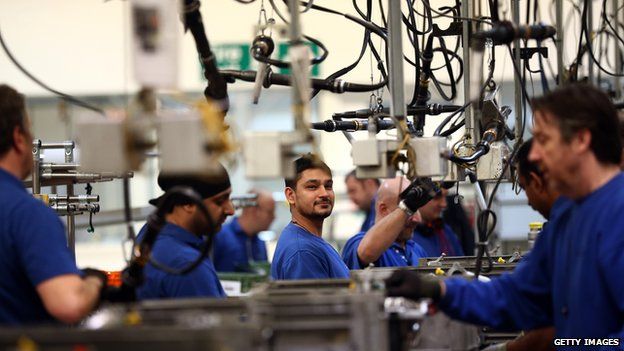UK manufacturing growth slowed in August, PMI survey says
- Published

Growth in the UK's manufacturing sector slowed slightly in August, a survey has suggested.
The UK manufacturing purchasing managers' index (PMI) fell to 51.5 in the month, down from 51.9 in July. Any score above 50 indicates expansion.
This was "well below" the index average over the past two-and-a-half years, compiler Markit said.
After two years of continual job creation, August saw a reduction in headcount in the sector.
"The UK manufacturing sector remains in a holding pattern, with production growth hovering around the stagnation mark and marginal job losses reported for the first time in 26 months," said Rob Dobson from Markit.
"Export order volumes continue to disappoint, with the sterling exchange rate, weak sales growth to the eurozone and the slowdown in China all having an impact."
He added that the sector was unlikely to contribute to the "solid gain in broader GDP growth expected for the third quarter".
Strong pound
Analysts highlighted the weakness in exports as a key problem for manufacturing in the UK.
"The survey indicates that UK manufacturers are continuing to find life very challenging as they are being held back, particularly by weak foreign orders," said Howard Archer from IHS Global Insight.
"In particular, sterling's strength - particularly against the euro - is seemingly constraining UK manufacturers."
On a brighter note, the survey found a "substantial drop" in input prices, which fell at "one of the steepest rates" seen in the past 16 years. This was down to lower oil and commodity prices, as well as the strong pound, which makes exports more expensive but imports cheaper.
The pound slipped immediately after the figures were announced, as markets bet that the weaker figures would push back the timing of any rate rise by the Bank of England.
Sterling fell half a cent against the dollar to $1.5339 and was down more than a cent against the euro at €1.3591.
- Published28 August 2015
- Published3 August 2015